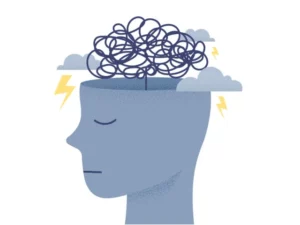We all know that feeling. That sense of dread that comes over us when we realize just how much work we have to do. Or when we are stuck in traffic on our way to an important meeting. Or when our kids are screaming and we can’t find the pacifier. This type of stress is known as cognitive stress, and it is a very common problem in today’s society. In this blog post, we will discuss what cognitive stress is, and how you can combat it using various methods!
Contents
Defining Cognitive Stress
 Let us begin by understanding what the word “cognitive” means. In human physiology and psychology, cognition is the mental action or process of acquiring knowledge and understanding through thought, experience, and the senses. In other words, it is our ability to think, learn, and remember. So when we say “cognitive stress,” we are referring to a type of stress that burdens our mental capabilities.
Let us begin by understanding what the word “cognitive” means. In human physiology and psychology, cognition is the mental action or process of acquiring knowledge and understanding through thought, experience, and the senses. In other words, it is our ability to think, learn, and remember. So when we say “cognitive stress,” we are referring to a type of stress that burdens our mental capabilities.
Typically, cognition consists of functions such as perception, attention, memory, reasoning, information manipulation, language, and executive function (which includes planning and decision-making). When we are under cognitive stress, our ability to perform these functions is impaired.
Stress, as we all know, is the body’s natural response to any demand placed upon it. It is a physical, mental, or emotional reaction to an event or situation that is perceived as threatening. When we are stressed, our bodies release hormones such as adrenaline and cortisol. These hormones increase our heart rate and blood pressure, and they also affect our brain function.
Cognitive stress is a type of stress that specifically affects our mental abilities. It can be caused by any number of things. The after-effects of this type of stress can leave us feeling overwhelmed, anxious, and even depressed.
Signs And Symptoms
Like we mentioned above, cognition consists of functions such as perception, attention, memory, reasoning, information manipulation, language, and executive function. When we are under cognitive stress, our ability to perform these functions is impaired. Some common signs and symptoms of cognitive stress include:
- Difficulty concentrating or focusing
- Poor memory
- Forgetfulness
- Disorganization
- Poor decision making
- Brain fog
- Sudden dip in productivity
- Loss of creativity
- Inability to think clearly
- Confusion
- Difficulty making decisions
- Feeling overwhelmed or bogged down
- Constant worry or anxiety
- Negative thinking or a negative outlook
All of us experience some form of cognitive stress in our daily lives. It’s the result of the endless stream of mental demands placed on us every day. From work deadlines and family obligations to managing our finances and keeping
Causes
Like any type of stress, cognitive stress has many different causes. Basically, anything that places a demand on our mental resources can cause cognitive stress. Some common causes of cognitive stress include:

- Work deadlines: One of the most common causes of cognitive stress is work deadlines. When we are up against a deadline, we often feel like we have to sacrifice our sleep, our social life, and even our health in order to meet it.
- Financial problems: Money is one of the most common sources of stress in general, and cognitive stress is no exception. Worrying about mohow to ney can cause us to lose focus at work, and it can also lead to problems with our memory and concentration.
- Family issues: Whether it’s caring for aging parents, dealing with a difficult child, or coping with the loss of a loved one, family issues can be a major source of cognitive stress.Health problems:
- Having too much to do in a short amount of time: When we try to cram too much into our schedule, it can lead to cognitive stress. This is because we are constantly trying to remember what we have to do next, and we often feel like we are running out of time.
- Chronic health issues: Disorders and illnesses, whether physiological or psychological, can take a toll on our mental resources, leaving us feeling stressed. They can also cause problems with our memory and concentration.
- Trying to learn something new and challenging: When we are trying to learn something new, it can be difficult to focus and remember what we need to do. This can lead to cognitive stress by putting a strain on our mental resources.
- Experiencing an unexpected event or change: As humans, unexpected events and changes can be very stressful. They can cause us to feel overwhelmed, anxious, and even depressed.
- Lack of support: Lastly, lack of support can also lead to cognitive stress. This is because we often feel like we have to do everything on our own, and we may not have anyone to turn to for help.
These are just a few of the many different things that can cause cognitive stress. It is important to remember that everyone experiences stress differently, and what may be stressful for one person may not be stressful for another.
Consequences
Like any type of stress, the effects and consequences of cognitive stress can vary from person to person. However, there are some common effects that many people experience when they are under too much cognitive stress. These include:
- Difficulty sleeping
- Fatigue
- Headaches
- Muscle tension or pain
- Indecisiveness
- Upset stomach
- Difficulty concentrating
- Clumsiness
- Poor memory
- Forgetfulness
All these can lead to a lot of troubles in our daily life across multiple domains. These include:
- Trouble at work: If you’re struggling to focus or complete tasks, it can lead to problems with your job performance. For example, you might make more mistakes, miss deadlines, or have difficulty completing projects.
- Trouble at home: If you’re feeling forgetful or struggling to focus, it can be difficult to keep up with household chores and responsibilities. You might start neglecting your appearance or let things slide around the house.
- Trouble in relationships: Stress can take a toll on your personal relationships. If you’re constantly feeling overwhelmed, you might withdraw from friends and family or have difficulty communicating effectively.
- Issues with mental health: Stress can trigger or worsen mental health problems such as anxiety and depression. It can also make it difficult to cope with other issues in your life.
If you’re struggling with cognitive stress, there are a few things you can do to help ease the burden. It is important to find effective and healthy coping mechanisms that work for you.
Ways To Manage
Fortunately, there are many different ways to manage cognitive stress. Some of the most effective methods include:

- Identify triggers: The first step is to identify the things that trigger your stress. Once you know what these are, you can start to develop a plan to avoid or deal with them.
- Get organized: One of the best ways to combat cognitive stress is to get organized. This means making a list of everything you have to do, and then breaking it down into smaller, more manageable tasks. You can also try using a planner or calendar to keep track of your commitments.
- Make time for yourself: It’s also important to make time for yourself, even if it’s just a few minutes each day. This means doing something that you enjoy, such as reading, taking a bath, or going for a walk.
- Exercise: Exercise is not only good for your physical health, but it’s also good for your mental health. Exercise can help to reduce stress and anxiety, and it can also improve your mood and memory.
- Eat healthily: Eating a healthy diet is important for overall health, but it’s also crucial for managing cognitive stress. Eating plenty of fruits, vegetables, and whole grains can help to improve your memory and concentration, and it can also reduce anxiety and depression.
- Get enough sleep: Sleep is essential for good health, and it’s also important for managing cognitive stress. When you’re well-rested, you’ll be able to think more clearly and concentrate better.
- Indulge in hobbies: Hobbies are a great way to relax and take your mind off of the things that are causing you stress. Whether you enjoy painting, gardening, or hiking, taking some time to do something you enjoy can help to reduce your stress levels.
- Form a schedule: Having a set schedule can help to reduce cognitive stress by giving you structure and routine. This means setting aside time each day for work, relaxation, and sleep.
- Seek support: If you’re struggling to cope with cognitive stress, it’s important to form a social support circle. This can consist of family, friends, or even a therapist. These people can offer you guidance and support when you’re feeling overwhelmed.
- Take breaks: When you’re feeling overwhelmed, take a few minutes to yourself to relax and rejuvenate. Take a hot bath, listen to calming music, or meditate.
- Get professional help: If you’re struggling to cope or self-help tips aren’t as efficient, seek out professional help. A therapist can teach you how to manage your stress, and they can also provide support and guidance.
Cognitive stress is a type of stress that can have many different causes. It is important to remember that everyone experiences stress differently, and what may be stressful for one person may not be stressful for another. There are many different ways to manage cognitive stress, and it is important to find the method that works best for you and your needs.
Conclusion
Conclusively, we can say that cognitive stress is a type of stress that can have many different causes. It is important to remember that everyone experiences stress differently, and what may be stressful for one person may not be stressful for another. There are many different ways to manage cognitive stress. It can happen either through organizing, making time for oneself, exercising, eating healthily, getting enough sleep, indulging in hobbies, forming a schedule or seeking support. Some people may also need to take breaks or seek professional help in order to manage their cognitive stress.
If you or someone you know is looking for psychological help, Therapy Mantra is here for you. We are the leading providers of online therapy and counseling. Our team of highly trained and experienced therapists can provide assistance at the most affordable rates. Contact us today to learn more about our services. You may also visit our website to book an online therapy session or download our free Android or iOS app for more information.


